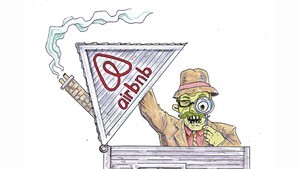
- File: Luke Awtry
- Burlington Mayor Miro Weinberger
Updated on March 21, 2022.
Burlington Mayor Miro Weinberger has vetoed an ordinance intended to curb the number of short-term rentals in the city.
The measure, which city councilors
approved last month by an 8-4 vote, was the result of a two-year debate over how to regulate properties rented out on sites such as Airbnb. The new rules would prevent property owners from running a short-term rental anywhere but in their permanent residence, with few exceptions. Proponents said the regs would free up long-term housing, which is sorely needed in a city with a meager vacancy rate of less than 2 percent.
Weinberger, however, said on Friday that the ordinance would be a barrier to creating new homes, "deepening the very problem that the STR restrictions seek to address."
In a
four-page veto letter to councilors, the mayor said the ordinance should allow property owners to create one whole-unit, short-term rental in "small, owner-occupied structures" such as accessory dwelling units, duplexes or triplexes. Councilor Sarah Carpenter (D-Ward 4) had proposed such language last month, but councilors rejected it.
Weinberger said property owners could use the income generated from these rentals to build more housing in the city, and that a "new STR fee or tax" could bolster the city's Housing Trust Fund, which helps build permanently affordable homes.
Further, Weinberger argued that the current ordinance encroaches on residents' property rights. Several Burlingtonians testified that they built accessory dwelling units for family members to use for part of the year with the intention of renting them out during other months.
"The City should not be interfering with the ability of residents to make personal decisions like this and I am concerned that in doing so we will cause some residents serious hardship," Weinberger wrote.
The mayor also said short-term rentals may not be as plentiful as once thought, suggesting that their numbers have dipped during the pandemic. In
summer 2019, there were more than 700 Airbnb listings. Now, Weinberger says "there is some reason to think" that short-term rentals have dipped to 200, or 1 percent of the city's rental stock.
Weinberger's position is a major shift from his stance in December, when councilors first reviewed the draft ordinance. At that point, the mayor spoke in favor of "a very restrictive policy" for short-term rentals as a means to solve the city's housing crisis.
In the veto letter, Weinberger asks the council to quickly return a new version of the ordinance for his consideration.
Outgoing City Council President Max Tracy (P-Ward 2) said he expects councilors will attempt to override the mayor's veto on Monday, and they may have the votes to do so: The eight councilors who supported the ordinance last month would provide the needed two-thirds majority to quash it.
Tracy is hopeful the override will pass.
"It would be really disappointing to see, at the end of two years of work, nothing happen to regulate STRs," he said.
City Councilor Joan Shannon (D-South District), a proponent of the ordinance, said she'll support the veto override effort, and took issue with several points in Weinberger's memo. Shannon said instead of worsening the housing shortage, the ordinance would open up units that were converted to short-term rentals, which are primarily for tourists.
She also refuted Weinberger's statement that the regulations are an overreach.
"I find that just astounding. We tell people through our zoning regulations what kind of windows they can have, where they can have them, what kind of siding they can use," Shannon said. "We [already] tell them in great detail what kind of intimate decisions they can make in their housing units."
Advocates with the Vermont Short-Term Rental Alliance, a group of more than 70 property owners with short-term rentals in Burlington,
issued a letter Friday supporting a mayoral veto. Members say that unlike the current ordinance, a policy that "allows middle class families to run responsible small-scale STR businesses" would benefit the local economy.
Shannon, however, isn't convinced.
"There is no question that short-term rentals benefit people with short-term rentals," she said. "The question is, what are the benefits to the community at large? There are some for sure, but you have to put that on a scale with community needs. Right now I'd like someone to tell me what’s a higher community need than housing."
The veto is Weinberger's third in his 10 years in office. He also rejected
a proposal to create an independent police oversight board and
a plan to reintroduce ranked-choice voting in mayoral, city council and school board elections. Councilors were unable to override either veto, though the body was eventually able to pass a different ranked-choice voting model.


















Comments
Comments are closed.
From 2014-2020, Seven Days allowed readers to comment on all stories posted on our website. While we've appreciated the suggestions and insights, right now Seven Days is prioritizing our core mission — producing high-quality, responsible local journalism — over moderating online debates between readers.
To criticize, correct or praise our reporting, please send us a letter to the editor or send us a tip. We’ll check it out and report the results.
Online comments may return when we have better tech tools for managing them. Thanks for reading.